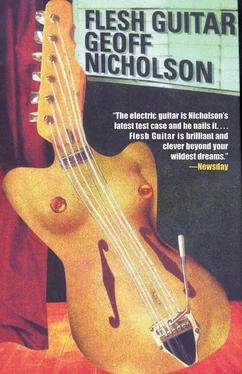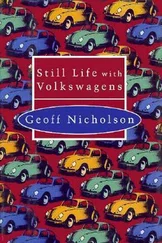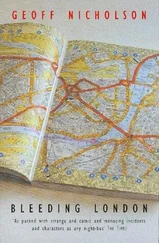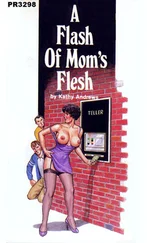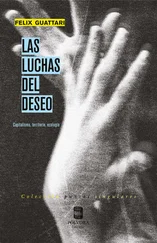‘Am I too late?’ he asks of the almost empty room.
Nobody responds and he hustles up to the bar. The manager ignores him completely and the barmaid carries on with her stacking, but eventually she calls across the room to ask what he wants.
‘Did I miss Jenny Slade?’ he asks, but something in his voice shows that he already knows the answer.
‘Was that her name?’ Kate replies. ‘Yeah, you missed a good show.’
‘A good show,’ he repeats bleakly.
‘Actually,’ she says, ‘it was more than a good show. It was a great show, totally cool. I was completely blown away.’
He slams his fist down on the bar and for a moment it looks as though he’s going to do the same thing with his head. There are tears in his eyes, tears of pain and absolute despair.
‘Can I get you a drink?’ Kate asks sympathetically.
‘Yes, whisky, lots of it.’
She eyes him uncertainly. He’s young, doesn’t look as though he’s much of a drinker, but he definitely needs something to sustain and console him.
‘Water with that?’ she enquires.
He doesn’t reply so she dilutes the whisky with a good splash of water. She doesn’t know why she should care. She sees young men drink themselves into oblivion every night of the week, but there does seem to be something uniquely vulnerable about this guy.
‘Come far?’ she asks.
‘From the ends of the earth.’
‘Yeah, you really missed something special,’ Kate says.
‘I know,’ he yells. ‘KNOW THAT!’
The manager glances over, wondering if the guy’s a troublemaker in need of bouncing, but he seems harmless enough and Kate is a much tougher cookie than she looks. The new arrival takes off his spectacles and lets the sweat and tears run freely down his wide, rounded cheeks.
‘Please tell me about it,’ he sobs.
‘What?’
‘Describe Jenny Slade’s performance to me. Please.’
The barmaid tries but it isn’t easy. She can’t put her enthusiasm into words, can’t begin to express the excitement of it. Besides, he wants masses of detail, more than she can provide. She wasn’t all that aware, for instance, of how Jenny Slade was dressed or how she stood or what the piece of music was, or what gauge of string she was using. Kate just knows that she loved it. Her account is lively but it does nothing to enliven the new customer. The more she enthuses, the more miserable he becomes.
‘What’s your name anyway?’ she asks.
‘Bob,’ he says. ‘Bob Arnold, and I’m Jenny Slade’s number one fan.’
‘Is that right?’
‘Yes, it is.’
‘Well, you have very good taste. So how come I never heard of her before?’
‘Because she’s a cult,’ Bob says shortly.
‘Tell me more.’
‘How long have you got?’
Kate thinks of the cheap, cold, low-ceilinged room that she calls home, a place she doesn’t want to return to. Then she contemplates a bar full of drink, the offer of company and the chance to hear more about Jenny Slade, though admittedly from a guy who looks like a nerd, and she replies encouragingly, ‘I’ve got as long as it takes.’
We can try to imagine Jenny Slade’s childhood; unhappy and solitary is always best for an artist. Did she come from conventional if progressive parents who encouraged their daughter in everything she did? Or was her mother a drunk, her father violent when not absent? And did some uncle encourage her to play music, did he pooh-pooh the notion that there was anything wrong with a thirteen-year-old girl strapping on an electric guitar? Did he go with her to buy her first good instrument, tune it for her, teach her some chords, pay for a few lessons?
What was her guitar teacher like? An ageing, chain-smoking rocker maybe, with a Ritchie Blackmore fixation, who after six months said, ‘Go, I can teach you no more’?
Did he like to talk about it afterwards?
‘Oh, I couldn’t really pretend that I taught Jenny Slade how to play the guitar,’ he might say, all appropriately modest. ‘With someone like Jenny that’s not what happens. You just show them how to start playing, how to start learning to play, and then you stand back and watch as they take off on that big, wide learning curve.
‘You know, there’s a certain kind of student whose hands just seem to curl naturally around the neck of the guitar and land on the fingerboard in just the right places. Jenny was like that.’
And does he shake his head a little sadly, savouring a sweet sorrow, as he says, ‘But one thing I’ve learned in my long teaching career is that it’s not about fingers. Fingers are finite whereas the human spirit is infinite. So it makes sense to play guitar with your spirit rather than your digits.
‘And one more thing I’ll say; start a girl or boy playing the guitar and they’ve got a metaphor of life and for life.’
And did she read Bert Weedon’s Play in a Day, and did she abandon it because she wasn’t sure she really wanted to know how to play ‘Bobby Shafto’?
Did she play rhythm guitar for her older brother and his friends, creating a backing for their long, inept solos? Did the arrangement come to an end, not because Jenny was bored with her role (in fact regarding it as some sort of Zen discipline) but because the boys realized she had outgrown them?
Did she walk into guitar shops, those complex arenas of male intimidation, and refuse to be intimidated? Did she overhear the salesman say, ‘Y’know as a guy gets older his dick seems to recede more and more — maybe it’s something to do with the size of his gut; anyways, when you hit middle age you’re generally in need of a little symbolic phallic extension. Some guys buy a Corvette, me, I recommend this lil’ beaut.
‘It’s called the Splatocaster. Pretty as a penis, ten times as big. Show your woman the spec on this monster and she’ll be squealing like a teeny bopper. She’ll be crying out for an encore and you’ll be able to give it to her.’
Did he only say all that stuff to embarrass her? Did she have to overcome sexist abuse? Did people tell her she needed balls to play the guitar? Did they say she played pretty good for a chick? Did she think Angus Young was a sad little fuck when he said that his ideal guitar would be a ‘cannon that shot sperm at the audience’? Or did she think he was a supreme ironist?
Did she have heroines? Did she dote on Ari Up and Ivy Rorschach and Sister Rosetta Tharpe, or was it less gender specific than that? Was it Bowie and Ronson, the rock performer as androgyne? We can assume a tortured adolescence. She was nobody’s idea of a dream date. She stayed in her room, read poetry, practised her guitar, listened to Django Reinhardt and Eddie Van Halen and Gaye Advert.
We can take for granted the false starts, the rip-offs, the broken promises, the bands that broke up after one gig, the managers who could make her a star. The rest we have to imagine, although there is the following rather improbable text that appeared in the fanzine JOSS (The Journal of Sladean Studies) , a piece purporting to be about Jenny Slade’s early experiences on the road. It is generally assumed that Jenny Slade did not in fact write the words, that the piece is fictionalized ‘autobiography’, written by a third party. Yet Jenny never objected to the publication and subsequent anthologizing of the piece so we assume she must have thought that in some sense it contains the truth about her early days on the road.
Call me Jenny Slade. Some years ago, having little or no money, and nothing particular to interest me at home, I thought I would tour about a little and see the rock and roll parts of the world. It is a way I have of driving off the blues. Whenever I find myself playing exclusively minor chords, when I find myself listening to Leonard Cohen albums, when it requires a strong act of will to prevent me from braining promoters, record reviewers and teeny boppers with the blunt end of my guitar, then I account it high time to get on the road as soon as I can.
Читать дальше
